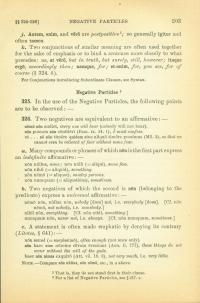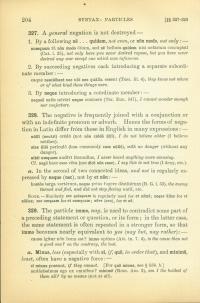325. In the use of the negative particles,1 the following points are to be observed.
326. Two negatives are equivalent to an affirmative.
Nēmō nōn audiet.
Every one will hear.
(Nobody will not hear.)
Nōn possum nōn cōnfitērī. (Fam. 9.14.1)
I must confess.
ut . . . nē nōn timēre quidem sine aliquō timōre possīmus (Mil. 2)
so that we cannot even be relieved of fear without some fear
a. Many compounds or phrases of which nōn is the first part express an indefinite affirmative.
nōn nūllus some
nōn nūllī (= aliquī) some few
nōn nihil (= aliquid) something
nōn nēmō (= aliquot) sundry persons
nōn numquam (= aliquotiēns) sometimes
b. Two negatives of which the second is nōn (belonging to the predicate) express a universal affirmative.
nēmō nōn, nūllus nōn
nobody [does] not, i.e. everybody [does]
[Cf. nōn nēmō not nobody, i.e. somebody]
nihil nōn
everything
[Cf. nōn nihil something]
numquam nōn
never not, i.e. always
[Cf. nōn numquam sometimes]
c. A statement is often made emphatic by denying its contrary (Litotes, Glossary: Rhetorical Figures).
nōn semel (= saepissimē)
often enough
(not once)
Nōn haec sine nūmine dīvom ēveniunt (Aen. 2.777)
These things do not occur without the will of the gods.
haec nōn nimis exquīrō (Att. 7.18.3)
not very much, i.e. very little
Note— Compare nōn nūllus, nōn nēmō, etc., in a. above.
327. A general negation is not destroyed:
- By a following nē . . . quidem (not even), or nōn modo (not only).
Numquam tū nōn modo ōtium, sed nē bellum quidem nisi nefārium concupīstī. (Cat. 1.25)
Not only have you never desired repose, but you have never desired any war except one which was infamous. - By succeeding negatives each introducing a separate subordinate member.
Eaque nesciēbant nec ubi nec quālia essent. (Tusc. 3.4)
They knew not where or of what kind these things were. - By neque introducing a coordinate member.
Nequeō satis mīrārī neque conicere. (Ter. Eun. 547)
I cannot wonder enough nor conjecture.
328. The negative is frequently joined with a conjunction or with an indefinite pronoun or adverb. Hence the forms of negation in Latin differ from those in English in many expressions.
Nūllī (neutrī) crēdō. (not nōn crēdō ūllī)
I do not believe either.
(I believe neither.)
sine ūllō perīculō (less commonly cum nūllō)
with no danger (without any danger)
Nihil umquam audīvī iūcundius.
I never heard anything more amusing.
Cf. negō haec esse vēra (dīcō nōn esse)
I say this is not true. (I deny, etc.)
a. In the second of two connected ideas, and not is regularly expressed by neque (nec), not by et nōn.
Hostēs terga vertērunt, neque prius fugere dēstitērunt, etc. (B. G. 1.53)
The enemy turned and fled, and did not stop fleeing until, etc.
Note— Similarly nec quisquam is regularly used for et nēmō; neque ūllus for et nūllus; nec umquam for et numquam; nēve (neu) for et nē.
329. The particle immo (nay) is used to contradict some part of a preceding statement or question, or its form; in the latter case, the same statement is often repeated in a stronger form, so that immo becomes nearly equivalent to yes (nay but, nay rather).
Causa igitur nōn bona est? Immo optima. (Att. 9.7.4)
Is the cause then not a good one? On the contrary, the best.
a. Minus (less)—especially with sī (if) or quō (in order that)—and minimē (least), often have a negative force.
sī minus possunt
if they cannot
[For quō minus, see § 558.b]
Audācissimus ego ex omnibus? Minimē. (Rosc. Am. 2)
Am I the boldest of them all? By no means. (not at all)


